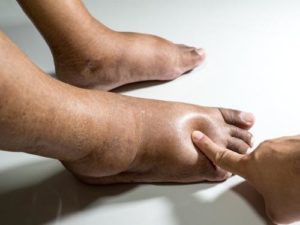 Swollen ankles in the elderly are known as lower extremity edema that often affects older adults. Foot edema is evident when the shoes become too tight or markings on the ankles from the socks. Swollen ankles are annoying and at risk of reduced mobility and skin breakdown, but what is happening inside the body? Although leg swelling is common, especially if you have been walking or standing for long, foot edema treatment is administered, if there is no known cause. Ankle swollenness is a challenging condition to manage. Contact Dr. Ejodamen Shobowale of DeNiel Foot & Ankle Center if you have any concerns regarding your swollen feet or ankles. All of your foot and ankle needs will be met by our doctor.
Swollen ankles in the elderly are known as lower extremity edema that often affects older adults. Foot edema is evident when the shoes become too tight or markings on the ankles from the socks. Swollen ankles are annoying and at risk of reduced mobility and skin breakdown, but what is happening inside the body? Although leg swelling is common, especially if you have been walking or standing for long, foot edema treatment is administered, if there is no known cause. Ankle swollenness is a challenging condition to manage. Contact Dr. Ejodamen Shobowale of DeNiel Foot & Ankle Center if you have any concerns regarding your swollen feet or ankles. All of your foot and ankle needs will be met by our doctor.
Lymphedema:
It is the collection of lymphatic fluid that develops because of the absence of lymph nodes or problems with lymph vessels. Lymph is a protein-rich fluid that travels along an extensive network of capillaries and vessels to destroy bacteria. Treatment for Swelling and Lymphedema in Houston is crucial to avoid lymph buildup that can cause challenges in wound healing and it could lead to infection and in severe cases deformity. Patients who have undergone cancer treatment need to see a foot doctor immediately they notice swelling of the ankles.
Venous Insufficiency:
The early symptoms of venous insufficiency are the swelling of the feet and ankles. In this condition, the blood inadequately moves from the lower extremity to the heart. The blood flows to the heart upward on one-way valves and when they are weak or damaged the blood leaks down and the fluid is retained in the soft tissues in the feet and ankles. In cases of chronic venous insufficiency, one can experience an infection, skin changes, and skin ulcers. You need to seek treatment for chronic venous insufficiency.
Infection:
People with diabetic neuropathy or other nerve problem conditions are at a greater risk for foot infections. Swelling of the ankles can be a sign of infection. Inspect your feet daily, if you notice swelling that appears infected contact your doctor immediately.
Ankle and foot injury:
An injury of the ankle or foot can cause swelling. Especially in cases where you have a sprained ankle that is caused by misstep or an injury where the ligaments that hold the ankle are stretched beyond the normal stretch. To reduce swelling from an injury rest, use ice packs and wrap in a bandage for compression then keep the foot elevated. If these home treatments do not work, book an appointment with a podiatrist for further diagnosis and treatment.
Liver, kidney, or heart disease:
Ankles swelling can indicate a problem with the liver, kidney, or heart. Ankles swelling in the evening is a sign of retaining water and salt because of right-sided heart failure. When the kidneys do not function properly the fluid builds up in the ankles and feet. Liver disease affects the production of the protein that keeps the blood from leaking into the surrounding tissues. A fluid leak occurs due to inadequate albumin production. Due to gravity, fluid accumulates in the ankles, chest, abdomen, and feet. It is also accompanied by weight gain, fatigue, loss of appetite, and shortness of breath.
Medication side effects:
Some drugs cause swelling to the ankles and feet as possible side effects. Such drugs include hormones, calcium channel blockers, anti-depressants, steroids, diabetes medications, and non-steroidal anti-inflammatory drugs.
Please feel free to contact our Houston, TX office if you have any questions. For all of your foot and ankle needs, we use the most up-to-date diagnostic and treatment technologies.
Comments
[…] Discover the common causes and effective treatments for swollen ankles in the elderly. Learn how to manage and prevent this condition to improve comfort and mobility in seniors. Read on for expert advice and practical tips. […]
[…] often necessary, can come with its own set of health challenges, one of the most common being foot swelling. This condition, medically known as edema, occurs when excess fluid builds up in the tissues, […]
[…] การใช้ยาบางชนิด เช่น ยาลดความดันโลหิต ฮอร์โมนทดแทน ยาต้านซึมเศร้า หรือยากลุ่มสเตียรอยด์ เป็นต้น […]